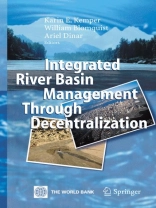Drawing upon a worldwide survey of river basin organizations and in-depth studies of eight river basins in a variety of locations around the globe, this book examines how institutional arrangements for managing water resources at the river-basin level have been designed and implemented, what the impetus for these arrangements has been, and what institutional features appear to be associated with greater or lesser success in river basin management.
Зміст
River Basin Management at the Lowest Appropriate Level: When and Why Does It Work in Practice?.- River Basin Management at the Lowest Appropriate Level: When and Why Does It (Not) Work in Practice?.- Comparative Analysis of Case Studies.- Determinants of River Basin Management Decentralization: Motivation, Process, and Performance.- The Case Studies.- Australia: Murray-Darling Basin.- Brazil: Alto Tietê Basin.- Brazil: Jaguaribe Basin.- Canada: Fraser Basin.- Costa Rica: Tárcoles Basin.- Indonesia: Brantas Basin.- Poland: Warta Basin.- Spain: Guadalquivir Basin.- Conclusion.- River Basin Management: Conclusions and Implications.
Про автора
Karin Kemper: Senior Water Resources Management Specialist, South Asia Environment and Social Unit, the World Bank, with research and project experience in Latin America and Asia and a number of publications in institutional economics relating to water resources management.
William Blomquist: Associate Professor of Political Science, Indiana University, Purdue Indianapolis, with research and consulting experience on water resource planning and policy and on institutions of water resource management.
Ariel Dinar: Lead Economist, Agriculture ad Rural Development Department, The World Bank and Professional Lecturer of International Relations – Energy, Environment, Science and Technology, School of Advanced International Studies, Johns Hopkins University, Washington, DC, USA.












